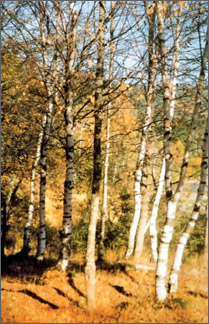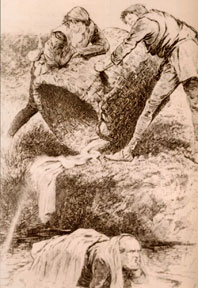The Merry Wives of Windsor
 Shakespeare, irreverently to the fore again; this time, haphazardly
with carelessness that suggests The Merry Wives of Windsor was written
in a hurry, as less as in a fortnight. Written in early 1597 especially
to be performed for a Garter celebration at Windsor. So, this is why
Shakespeare is not at his best or near-best. One reason is that Queen
Elizabeth wished to see Falstaff in love (for God sake) in this
predominantly prose comedy, which is the result. So, one cannot blame
the Bard, under these circumstances. Shakespeare, irreverently to the fore again; this time, haphazardly
with carelessness that suggests The Merry Wives of Windsor was written
in a hurry, as less as in a fortnight. Written in early 1597 especially
to be performed for a Garter celebration at Windsor. So, this is why
Shakespeare is not at his best or near-best. One reason is that Queen
Elizabeth wished to see Falstaff in love (for God sake) in this
predominantly prose comedy, which is the result. So, one cannot blame
the Bard, under these circumstances.
Never a favourite with academics, it usually goes well in the
theatre, especially in its repetitive methods only if we realise that
some of the characters have the names of great originals but little
else. The names are stupid such as Falstaff, Shallow, Pistol, Bardolph,
Quickly. They are all in the receiving end of the merry widows but
mercilessly, Falstaff is spared. Leonates is the key of the comedy and
works himself to a glorious rage as displayed in sheer virtuosity by Ian
Richardson at Stratford in 1975.
Synopsis
|
Credits
* Mistress Alice Ford - One of the wives who three times trap.
Falstaff when he first enters her house when she should be asleep. His
greeting is ‘Have I caught thee, my heavenly jewel’ which is the first
line of a sonnet by Phillip Sydney.
* Sir John Falstaff - The knight of the Garter Inn at Windsor. His
namesake Falstaff would never have submitted himself unto these
humiliations but his part of 496 lines is very theatrical.
* Mistress Page - The other laughing conspirator and the longer part
* Anne Page - ‘Sweet Anne’ much courted with support of Caius as
husband from her mother.
* Mistress Quickly - The third longer part. She is housekeeper to Dr
Caius.
* Slender - A minor Sir Andrew
* Shallow - Only the name connects
* Ford - The jealous husband
* Parson Hugh Evans - Another Welsh part of the actor in Shakespeare
company.
* Caius - A doctor Frenchman represented by a series of fizzling
verable rockers.
* Simple - Slender's man.
* Pistol - Still speaking inflated blank verses, fades away feebly.
|
 |
|
Falstaff disguised as a ghost of Herne
the Hunter, meets Mistress Ford in this Windsor Forest at
midnight. |
Written in 1597-8 and sited in Windsor and its neighborhood, The
Merry Wives of Windsor opens with Sir John Falstaff short of money at
Windsor and woo both Mistress Ford and Mistress Page who happen to be
the prosperous wives of two citizens. Falstaff send identical letters to
them but this is revealed by one of the two discharged followers, Pistol
and Nym.
Only the jealous Ford takes real notice.
He goes into the Garter In disguised as ‘Master Brook’ requests
Falstaff to woo Mistress Ford (his wife) on his behalf but learns that
the knight already has an assignation. The wives prepare to trick
Falstaff.
Simultaneously, other complex love-matters are in progress. The
French physician, Caius is in love with Anne Page and challenges Parson
Hugh Evans for a dual, simply because Evans has requested the doctor's
housekeeper, Quickly to help the foolish Abraham Slender for Anne's
hand. Anne as we have seen is in love with Master Fenton,
(Enter Page)
Page – Come gentle Master Slender, come; we stay for you.
Slender – I'll eat nothing, I thank you Sir
P. - By cock and pie, you shall not choose Sir, come, come.
S. - Nay, pray you lead the way.
P. - Come on Sir.
S. - Mistress Anne, yourself shall go first.
P. - Not I sir, pray you keep on
S. - Truly I will got go first; truly. La’ I will not do you that
wrong.
P. - I pray you Sir.
S. - I will rather be unmarried, than troublesome. You do yourself
wrong, indeed la’ (AT. 1.)
Caius and Evans are reconciled after Quickly is enlisted by the Host
of the Garter who prevented the dual.
Falstaff is carried from Ford's house just as Ford arrives to search
a laundry basket of dirty linen. Ford discovers what has happened and
comes to know of a new assignation between Falstaff and Mistress Ford.
This time Falstaff manages to escape in the guise of a maid's aunt.
Still unknowingly, Ford beats him unmercifully thinking her to be a
witch... (Re-enter Falstaff in woman's led by Mrs Page)
Mrs Page – Come. Mother Prat, come give me your hand.
Ford – I'll prat her, out of my door you witch (beats him), you hag,
you baggage, you polecat, you ronyon; out I'll conjure you. I'll fortune
tell you.
Mrs Page – Are you not asahamed. I think you have killed the poor
woman...
 |
|
Falstaff in order to escape the
jealous anger of Master Ford hides in a washing basket which
is emptied into the Thames by the servants, John and Robert.
(From Merry wives of Windsor) |
At length the jest revealed to their husbands, the wives get Falstaff
disguised as a ghost of Ferne the Hunter, to meet Mistress Ford in
Windsor Forest at midnight. There everything is settled when Falstaff is
assailed by a group of Windsor children disguised as a group of fairies
and goblins. Caius and Slender are tricked into running off with a boy
‘fairy’ thinking her to be Anne. Fenton and Anne appear, just married
and the end will be a journey home.
And Shakespeare could not have mucked up more.
In performance
Winter being the season that Shakespeare wrote this play, a part of
it is acted in a summer setting but many points reveal the winter
setting. The speech on the order of the Garter assinged to the ‘Fairy
Queen’ is often delected with more reason though they did appear at the
Mermaid in 1975 and Stratford in 1979 after a ‘horse stealing’ German
making it a topical joke.
In the 18th century the comedy was approved in London with John
Henderson and Antony Quinn as popular Falstaffs thro’ the 19th century
as well. John Keah who played Ford at the Princess in 1851, was better
than usual. Tree was not a good Falstaff at the Haymarket in 1889 but
here, Ellen Terry and Madge Kendal as the wives were brave enough to do
the pieces in its proper winter setting at the Garrick in 1911.
Bridges-Adama directed a famous version in 1923 with lyric, at
Hammersmith with Edith Evans and Dorothy Greene as the wives.
As version by version was mounted, the play picked up popularity
until a very notable production at the Old Vic in 1951, simply
mesmerised the audiences.
In other terms, Fredrick Reynolds made a wild musical adaption at
Drury Lane in 1824. In Opera, Otto Nicholai composed The Mery Wives of
Windsor in 1849. Yet another was very very ambitious ‘Falstaff’ by Verdi
and still later in 1929, Vaughan Willimas's opera was titled Sir John in
love.
|



